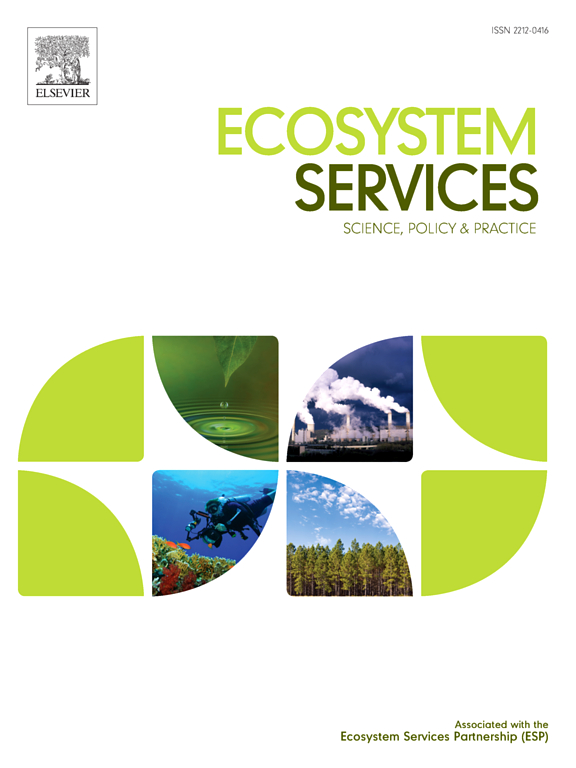Total economic Vulture: The value of ecosystem services provided by vultures in Southern Africa
IF 6.6
2区 环境科学与生态学
Q1 ECOLOGY
引用次数: 0
Abstract
Africa is home to eleven species of vultures, seven of which face the risk of extinction and are listed as Vulnerable, Endangered or Critically endangered on the IUCN Red List. The major threats are poisoning, belief-based use, electrocutions and collisions. The loss of vultures in Asia provided a window into a catastrophic scenario without vultures and the impact of the loss of the ecosystem services they provide. In the African context, there is a knowledge gap on the importance of vultures to humans and the impact that a loss of vultures would have. This paper attempts to fill this gap with an economic valuation of the ecosystem services provided by vultures in Southern Africa, with a focus on Botswana, Zambia and Zimbabwe. The ecosystem services addressed in the assessment include provisioning, regulating and cultural services. Data were collected through four surveys targeting different beneficiary groups: 1. local communities in the Kavango Zambezi Transfrontier Conservation Area; 2. the general public within each country; 3. the international public; and 4. rangers and park managers. A mix of valuation methods were used including discrete choice experiments, contingent valuation, avoided damage costs, replacement costs, and net factor income. The total economic value of ecosystem services in the three countries is estimated to be just over USD 250 million per year. This is largely attributed to existence and bequest values and the sanitation and pest control service provided by vultures. Although vultures are arguably not as charismatic as other species of interest in the continent, their conservation is highly important to the welfare and health of people in Southern Africa.
总经济秃鹫:非洲南部秃鹫提供的生态系统服务价值
非洲是11种秃鹫的家园,其中7种面临灭绝的危险,被列为世界自然保护联盟红色名录中的易危、濒危或极度濒危物种。主要的威胁是中毒、基于信仰的使用、触电和碰撞。秃鹫在亚洲的消失提供了一个窗口,让我们看到没有秃鹫的灾难性情景,以及它们提供的生态系统服务丧失的影响。在非洲的背景下,人们对秃鹫对人类的重要性以及秃鹫的消失所带来的影响还存在知识缺口。本文试图通过对南部非洲秃鹫提供的生态系统服务的经济评估来填补这一空白,重点是博茨瓦纳、赞比亚和津巴布韦。评估中涉及的生态系统服务包括供应、调节和文化服务。通过针对不同受益群体的四项调查收集数据:卡万戈赞比西跨境保护区的当地社区;2. 民众:每个国家的普通民众;3. 国际公众;和4。护林员和公园管理员。我们使用了多种评估方法,包括离散选择实验、或有评估、避免损害成本、重置成本和净要素收入。据估计,这三个国家生态系统服务的总经济价值每年略高于2.5亿美元。这在很大程度上归因于秃鹰的生存和遗产价值,以及秃鹰提供的卫生和虫害防治服务。尽管秃鹫不像非洲大陆上的其他物种那样有魅力,但它们的保护对南部非洲人民的福利和健康非常重要。
本文章由计算机程序翻译,如有差异,请以英文原文为准。
求助全文
约1分钟内获得全文
求助全文
来源期刊

Ecosystem Services
ECOLOGYENVIRONMENTAL SCIENCES&-ENVIRONMENTAL SCIENCES
CiteScore
14.90
自引率
7.90%
发文量
109
期刊介绍:
Ecosystem Services is an international, interdisciplinary journal that is associated with the Ecosystem Services Partnership (ESP). The journal is dedicated to exploring the science, policy, and practice related to ecosystem services, which are the various ways in which ecosystems contribute to human well-being, both directly and indirectly.
Ecosystem Services contributes to the broader goal of ensuring that the benefits of ecosystems are recognized, valued, and sustainably managed for the well-being of current and future generations. The journal serves as a platform for scholars, practitioners, policymakers, and other stakeholders to share their findings and insights, fostering collaboration and innovation in the field of ecosystem services.
 求助内容:
求助内容: 应助结果提醒方式:
应助结果提醒方式:


